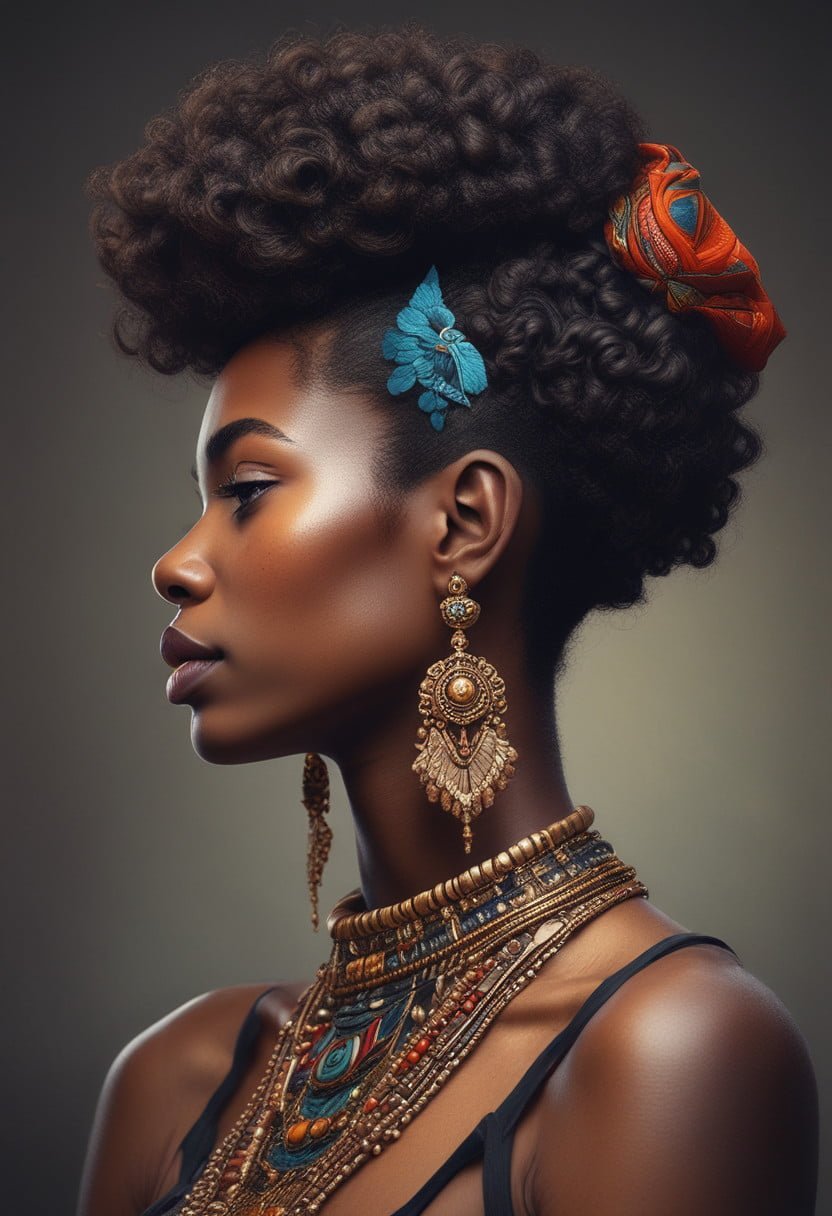
Maintaining moisture can be a challenge for black women when it comes to their hair, but fear not! In this article, we will explore effective strategies that will help keep your hair hydrated and prevent dryness. Additionally, we will provide tips on how often you should wash your African American hair to maintain its health and vitality. From nourishing hair products to proper washing techniques, you’ll discover practical solutions that will leave your hair feeling moisturized and looking fabulous all day long.
Understanding The Unique Needs of Black Hair
Black hair has unique characteristics that require specific care to maintain its health and vitality. One of the most common challenges faced by individuals with black hair is dryness. The tight curls and coils in black hair make it difficult for natural oils to travel down the hair shaft, resulting in a lack of moisture. Understanding the factors that contribute to dryness in black hair is crucial in developing an effective hair care routine.
Dryness Factors in Black Hair
Several factors contribute to the dryness experienced by black hair. Firstly, the tight curls and coils in black hair make it challenging for the natural oils produced by the scalp to reach the entire length of the hair strand. This leads to a lack of moisture and can result in dry, brittle hair. Secondly, the use of harsh chemical treatments, such as relaxers and dyes, can strip the hair of its natural oils and further contribute to dryness. Finally, environmental factors such as heat, humidity, and exposure to the sun can also deplete moisture from black hair.
The Role of Natural Hair Oils
Natural hair oils play a vital role in maintaining the moisture and health of black hair. The scalp produces sebum, a natural oil that helps to moisturize the hair and protect it from damage. However, due to the tight curls and coils in black hair, sebum often struggles to travel down the hair shaft effectively. This is why it is crucial to supplement the hair with additional oils to keep it moisturized and nourished. Popular natural hair oils for black hair include coconut oil, jojoba oil, and avocado oil, which provide hydration and seal in moisture.
The Impact of Environmental Factors
Environmental factors can have a significant impact on the health and hydration of black hair. Excessive exposure to sunlight can cause the hair to become dry and brittle. Heat styling tools, such as flat irons and curling irons, can also cause damage and moisture loss if used excessively or at high temperatures. Additionally, humid weather can lead to frizz and increased dryness in black hair. It is vital to protect the hair from these environmental factors by using heat protectant sprays, wearing protective styles, and properly moisturizing the hair.
Proper Washing and Conditioning Discipline
Establishing a proper washing and conditioning routine is crucial for maintaining the health and moisture balance of black hair.
Determining the Right Frequency of Washing
The frequency of washing black hair varies depending on individual preferences and lifestyle factors. However, it is generally recommended to wash black hair once every 7-10 days. Over-washing can strip the hair of its natural oils, contributing to dryness, while under-washing can lead to product buildup and an unhealthy scalp. It is important to monitor your hair’s needs and adjust your washing frequency accordingly.
Choosing Proper Shampoos and Conditioners
When selecting shampoos and conditioners for black hair, it is essential to choose products that are specifically formulated for this hair type. Look for shampoos and conditioners that are sulfate-free and moisturizing. Sulfates can be harsh and strip the hair of its natural oils, contributing to dryness. Moisturizing formulas help to nourish and hydrate the hair, promoting moisture retention and preventing dryness.
Benefits of Deep Conditioning Treatments
Deep conditioning treatments are a crucial step in maintaining the moisture balance of black hair. These treatments provide intense hydration and nourishment to the hair, replenishing moisture and restoring elasticity. Regular deep conditioning treatments can improve the overall health and manageability of black hair. It is recommended to deep condition the hair at least once a week or every two weeks, depending on the hair’s moisture needs.
Optimal Drying Techniques
How you dry your black hair plays a significant role in its overall health and moisture retention.
Avoiding Harsh Drying Methods
Harsh drying methods, such as rubbing the hair vigorously with a towel, can lead to breakage and moisture loss. It is crucial to be gentle when drying black hair to minimize damage. Avoid using rough towels or aggressively towel-drying the hair. Instead, opt for softer materials and pat the hair dry gently.
Embracing Air Drying
Air drying is an excellent option for black hair as it minimizes heat damage and allows the hair to retain its moisture. After washing and conditioning, gently squeeze out excess water from the hair using a soft towel or an old t-shirt. Allow the hair to air dry naturally, avoiding direct sunlight if possible. This method helps to maintain the hair’s moisture levels and promotes healthy hair growth.
The Use of Microfiber Towels
Using microfiber towels or hair wraps can be beneficial for drying black hair. Unlike traditional cotton towels, microfiber towels are gentler on the hair and help to minimize frizz and breakage. They absorb excess water without stripping the hair of its moisture, making them an excellent option for preserving the hair’s health and promoting moisture retention.
Importance of Regular Hydration
Hydrating black hair is essential for maintaining its health and preventing dryness. Proper hydration not only improves the appearance and feel of the hair but also promotes growth and minimizes breakage.
Drinking Plenty of Water
Hydration starts from within, and drinking an adequate amount of water is crucial for overall hair health. Staying hydrated helps to keep the scalp moisturized, which in turn promotes the health of the hair follicles. Aim to drink at least eight glasses of water per day to maintain optimal hydration levels and support the health of your black hair.
Incorporating Hydrating Hair Masks
Hydrating hair masks are an excellent way to provide intense moisture to black hair. These masks are formulated to penetrate the hair shaft and deliver essential nutrients and hydration. Look for hair masks that contain ingredients such as shea butter, aloe vera, and hyaluronic acid, as they provide deep hydration and nourishment to the hair. Use a hydrating hair mask once a week to maintain optimal moisture levels in your black hair.
Utilizing Moisturizing Leave-In Conditioners
Leave-in conditioners are a must-have for black hair care routines. These products provide continuous hydration and help to seal in moisture. Look for leave-in conditioners that are lightweight and specifically designed for black hair. Apply a small amount to damp hair after washing and conditioning to keep your hair moisturized throughout the day.
Integrating Healthy Dietary Habits
Proper nutrition plays a significant role in promoting the health and moisture retention of black hair. Certain nutrients are essential for maintaining strong, hydrated hair.
Incorporating Omega-3 Fatty Acids
Omega-3 fatty acids are known for their ability to nourish the hair and support its overall health. Incorporate foods rich in omega-3 fatty acids into your diet, such as salmon, walnuts, chia seeds, and flaxseeds. These foods help to strengthen the hair and prevent dryness and breakage.
Increasing Biotin Intake
Biotin is a B vitamin that is essential for healthy hair growth and moisture retention. Increasing your intake of biotin-rich foods, such as eggs, almonds, sweet potatoes, and spinach, can help improve the moisture balance of black hair. Additionally, biotin supplements can be beneficial for individuals with biotin deficiencies or those looking to promote hair growth and moisture retention.
Consuming Foods Rich in Vitamins A and E
Vitamins A and E are important for maintaining the health and moisture balance of black hair. Foods such as carrots, sweet potatoes, spinach, avocados, and almonds are rich in these vitamins and can contribute to the overall health of your hair. Including these foods in your diet can promote moisture retention and support the growth of strong, hydrated black hair.
Proper Use of Hair Products
Using the right hair products is crucial for maintaining the health and moisture balance of black hair. Pay attention to the ingredients in your hair products and opt for those that promote hydration and nourishment.
Avoiding Products with Alcohol and Sulfates
Alcohol and sulfates can be extremely drying to black hair. It is essential to read the labels and avoid hair products that contain these ingredients. Alcohol-based products can strip the hair of its natural oils, contributing to dryness. Sulfates, commonly found in shampoos, can also be harsh and lead to moisture loss. Instead, opt for alcohol-free and sulfate-free products that are specifically formulated for black hair.
Understanding the Benefits of Oils and Butter
Oils and butter are excellent products for maintaining moisture in black hair. They provide additional nourishment and hydration, sealing in moisture and preventing dryness. Look for natural oils such as coconut oil, jojoba oil, and argan oil, as they penetrate the hair shaft and provide deep hydration. Shea butter is also a popular ingredient known for its moisturizing properties and ability to improve the health of black hair.
Determining the Right Amount of Product to Use
Using the right amount of hair product is essential for maintaining the moisture balance of black hair. Applying too much product can weigh the hair down and make it appear greasy, while using too little may not provide enough hydration. It is important to find the right balance for your hair type and adjust the amount of product accordingly. Start with a small amount and gradually increase or decrease as needed.
Benefits of Using Natural Ingredients
Incorporating natural ingredients into your black hair care routine can provide numerous benefits and help maintain its health and moisture.
Incorporating Aloe Vera
Aloe vera is a versatile natural ingredient known for its hydrating and soothing properties. It helps to moisturize the hair, reduce scalp irritation, and promote healthy hair growth. Look for hair products that contain aloe vera or incorporate fresh aloe vera gel into your hair care routine. Regular use of aloe vera can improve the moisture balance and overall health of black hair.
Benefits of Using Honey
Honey is another natural ingredient that offers numerous benefits for black hair. Its humectant properties help to attract and retain moisture, keeping the hair hydrated and preventing dryness. Honey also contains antioxidants that promote scalp health and strengthen the hair follicles. Incorporate honey into your deep conditioning treatments or look for hair products that contain honey to reap its moisturizing benefits.
Role of Avocados in Nourishing Hair
Avocados are a rich source of vitamins, minerals, and healthy fats that can nourish and hydrate black hair. The natural oils present in avocados help to moisturize the hair and prevent dryness. Mash a ripe avocado and apply it as a hair mask, focusing on the ends and lengths of the hair. Leave it on for 30 minutes to an hour before rinsing thoroughly. Regular use of avocado hair masks can replenish moisture and improve the overall health of black hair.
The Impact of Styling on Hair Health
The way you style your black hair can have a significant impact on its health and moisture retention. Paying attention to the following factors can help maintain the moisture balance of your hair.
Avoiding Tight Hairstyles
Tight hairstyles, such as ponytails, braids, and buns, can cause tension on the hair strands and lead to breakage and dryness. Opt for looser hairstyles that do not pull the hair too tightly, allowing it to breathe and retain its moisture. If you choose to wear tight styles occasionally, make sure to give your hair breaks and moisturize thoroughly to prevent damage.
Minimizing the Use of Heat Tools
Heat styling tools, such as flat irons and curling irons, can cause moisture loss and damage to black hair if used excessively or at high temperatures. Minimize the use of heat tools and opt for heat-free styling methods whenever possible. If you do use heat tools, always apply a heat protectant spray beforehand and use the lowest heat setting that achieves your desired style.
Embracing Protective Styling
Protective styling is an excellent way to minimize damage and promote moisture retention in black hair. Protective styles, such as braids, twists, and updos, keep the ends of the hair tucked away, preventing breakage and dryness. When opting for protective styles, ensure that they are not too tight and allow your scalp and hair to breathe. Remember to moisturize regularly and give your hair breaks between styles to maintain its health.
Balancing Protein Treatments
Protein is a crucial component of healthy hair, as it helps to strengthen the hair shaft and prevent breakage. However, it is important to find the right balance when using protein treatments for black hair.
Understanding the Role of Protein in Hair Health
Protein treatments help to restore strength and elasticity to the hair strands, preventing breakage and promoting overall hair health. They are particularly beneficial for addressing damage caused by chemical treatments or excessive heat styling. Protein treatments help to replenish the protein lost from the hair, improving its structure and reducing breakage.
Determining the Right Frequency of Treatments
While protein treatments are beneficial, it is important not to overdo them. Too much protein can lead to a condition called protein overload, where the hair becomes dry and brittle. The frequency of protein treatments depends on the individual’s hair needs and protein sensitivity. It is generally recommended to do a protein treatment every 4-6 weeks or as needed. Monitor your hair’s response and adjust the frequency accordingly.
Choosing the Right Protein Treatments
There are various types of protein treatments available, ranging from light to intense. For black hair, it is best to opt for mild protein treatments that provide gradual repair. Look for products that contain hydrolyzed proteins or amino acids, as they are easily absorbed by the hair shaft and promote repair and moisture retention. It is essential to follow the instructions provided with the protein treatment and not leave it on for longer than recommended to avoid potential damage.
Maintaining Healthy Hair Practices
In addition to following a proper hair care routine, maintaining healthy practices is essential to maximize the health and moisture retention of black hair.
Regular Trimming of Hair Ends
Regular trimming of split and damaged ends is crucial for maintaining the overall health of black hair. Split ends can lead to further damage and moisture loss, hindering the hair’s ability to retain moisture. Schedule regular trims every 8-12 weeks, or as needed, to keep your hair ends healthy and prevent breakage.
Avoiding Over-Manipulation of Hair
Over-manipulating black hair can lead to breakage and dryness. Excessive brushing, combing, and styling can cause damage to the hair strands and disrupt the hair’s moisture balance. Limit the amount of manipulation and try to handle your hair with care. Opt for gentle detangling methods, such as using a wide-toothed comb or your fingers, and avoid excessive pulling or tugging.
Getting Regular Scalp Massages
Scalp massages are not only relaxing but also promote hair health and moisture retention. Massaging the scalp increases blood circulation, which in turn promotes the flow of nutrients to the hair follicles. This helps to nourish the hair and maintain its moisture balance. Incorporate scalp massages into your hair care routine using your fingertips and gentle circular motions for a few minutes each day.
By understanding the unique needs of black hair and implementing a comprehensive hair care routine, you can maintain its health, moisture, and overall beauty. Proper washing and conditioning, optimal drying techniques, regular hydration, healthy dietary habits, correct use of hair products, and mindful styling practices are all essential components of a successful black hair care routine. Embrace these practices and enjoy the radiant, well-nourished hair you deserve.











